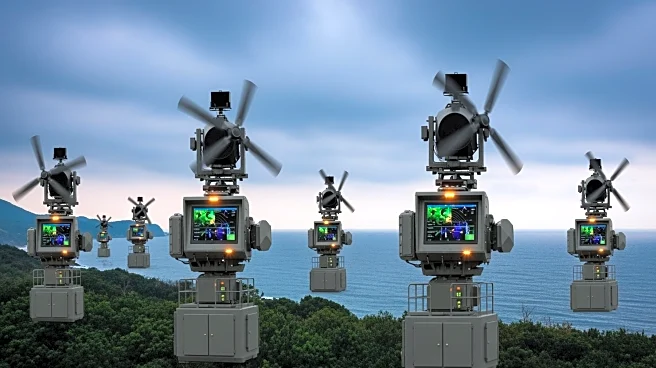What's Happening?
Taiwan is facing increasing military threats from China, prompting the island nation to bolster its defense capabilities. President William Lai has announced plans to increase defense spending to 5% of
GDP and develop an anti-missile shield known as the 'T-dome.' Despite the heightened threats, the mood in Taiwan remains calm, with citizens continuing their daily lives. The Taiwanese government is focusing on deterrence strategies to impose significant costs on China should it attempt an invasion. This includes investing in missile technology and small, dispersible platforms to counter Chinese forces. The People's Liberation Army of China has been undergoing a transformation, with increased investment in indigenous weapons production and military capabilities aimed at Taiwan.
Why It's Important?
The situation in Taiwan is critical due to its strategic importance in the global economy, particularly in semiconductor production. Any military conflict or blockade could have severe repercussions, potentially destabilizing the world economy more than previous crises like COVID-19 or the Ukraine invasion. Taiwan's defense strategy aims to deter Chinese aggression by making any potential invasion costly and challenging. The island's resilience is bolstered by its role in the global supply chain, which could prompt international intervention if China attempts to blockade or invade. The geopolitical implications are significant, as Taiwan's security is closely tied to U.S. interests and regional stability in the Indo-Pacific.
What's Next?
Taiwan plans to increase its defense budget and continue developing its military capabilities to counter Chinese threats. The international community, particularly the United States, may play a crucial role in supporting Taiwan's defense efforts. The potential for diplomatic or military intervention by regional powers like Japan and South Korea remains high if China escalates its military actions. Taiwan's government will need to navigate internal political divisions to maintain a unified defense strategy. The upcoming meeting between President Trump and Xi Jinping could influence U.S.-China relations and impact Taiwan's security situation.
Beyond the Headlines
The ongoing tension between Taiwan and China highlights broader issues of national sovereignty and the challenges faced by small democracies under threat from larger authoritarian regimes. Taiwan's situation underscores the importance of international alliances and the role of global economic interdependence in maintaining peace. The ideological differences between Taiwan's democratic system and China's communist regime add complexity to the conflict, influencing both domestic and international perceptions and policies.








